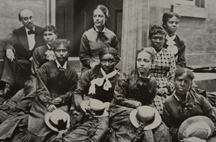| |

Home
|
|
| |
Books of the 20th Century Exhibition
An introduction to some publications that have shaped the field of education.
The Maxine Greene Memorial Celebration
October 6, 2014; Teachers College
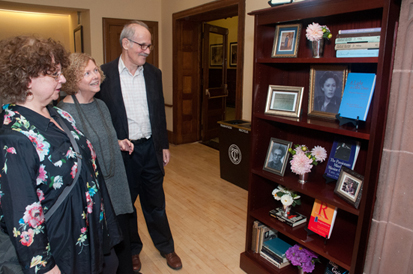
l-r: Carole Saltz, Janet L. Miller, Timothy Greene
looking at the memorial display for Maxine Greene
Photo credit: Heather Van Uxem Lewis; Teachers College, Columbia University
Comments by Bill Ayers and Michelle Fine
|
|
| |
Notes from the Memorial for Maxine
by Bill Ayers
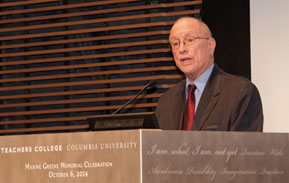
Photo credit: Heather Van Uxem Lewis; Teachers College, Columbia University
How wonderful to be conjuring once more our dazzling and matchless Maxine, our dear, sweet friend, our teacher—the finest any of us could hope for—who always found new and surprising ways to nourish each of us and simultaneously to challenge us with a simple word or a single gesture. She was our inspiration; she is our treasure still.
Maxine would have loved this—all of us gathered together at Teachers College in a kind of intentional if transient community, and she would have loved—particularly—that she had, as she might have put it, “just a little to do” with our being here.
But she would have been slightly embarrassed as well, and a bit ambivalent—“unwarranted praise” she might call it, and she would certainly resist any attempt to suspend her in amber—even now—or to pin her to a board like a butterfly. She wanted no pedestal. I’ve been in situations with her more than once—when she was younger, yes, but accelerating with age—where the admiration became too thick for her, and the accolades too sticky, and she would turn to me and whisper urgently, “Get me out of here!” She was allergic to sainthood.
“I am what I am not yet” she reminded us again and again. She saw herself—and each of us—as an unruly spark of meaning-making energy embarked on a voyage of discovery and surprise, thrust into a going world without guarantees, destined to have her blooming in the noise of the whirlwind. I’m more than my statistical profile, she said, and I won’t be summed up, once and for all. True even now.
There was a disarming modesty in her. “I’m a person stumbling around with questions,” she said of herself, “questions that continually arise…questions leading to partial answers and then opening to more questions.”
Coming from the stage where she’d just presented on a panel with Paulo Freire many years ago—a talk in which she’d brought down the house and left everyone breathless—she asked, “Did I do alright? Do you think they liked it?” We thought she must be kidding, and while this was characteristically self-mocking, she wasn’t kidding.
Because it was more than modesty—she carried her outsider experience and history with her as well: being a woman in a tightly policed world of men; growing up in the early last century a Jew, and then a red. She knew walls and barriers; she knew something, as well, of storming the barricades.
|
|
| |
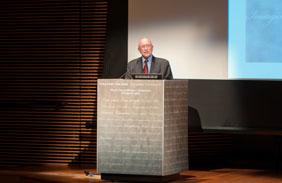
Photo credit: Heather Van Uxem Lewis; Teachers College, Columbia University
She began her introductory class by telling students that we would be “doing philosophy together”—an odd and attention-grabbing provocation. She explained that philosophy was once considered “the queen of the sciences,” but had become, at best, a queen with a tarnished crown, badly askew. That was OK, she said, because it wasn’t royalty we wanted, but awareness. We would not now bow before the canon; but, working with all the available light we could summon—ideas and texts and the arts, the events of the world as well as our own daily encounters—we would struggle to become more aware of ourselves in the world, our inter-subjective predicaments and our partial and incomplete understandings.
Her teaching had an improvisational feel to it—fresh and vital and intimate even as it was rooted firmly in a coherent ground of core beliefs—in part because she harvested it from her own lived experience.
One bitter, snowy evening we’d been talking about homelessness and how the unacceptable was being transformed into the expected right before our eyes, and also about detachment and imposed or willful blindness: the opposite of moral, she argued, was not immoral, but indifferent. She’d gone home that night and noticed a man she’d seen many times before wrapped in a blanket on a bench across from her apartment. She felt compelled to speak to him, to engage him, and she crossed over and invited him upstairs for a bowl of soup. He recoiled from her angrily and snapped: “What do you want from me lady? I’m not going with you.” “I was so relieved,” she told us, and that cracked us up, but it was so emblematic: insisting on being real, flawed and imperfect, a work-in-progress.
That was Maxine in full: bringing her values to life day by day, but always illuminating her own ambivalences and conflicts. Her dialectical mind dazzled us because it worked so unabashedly in contradiction and it worked out loud and in public. She said in class once, speaking then of the power of punk rock, that she thought it was critical, of course, that we construct our taste and values for ourselves, our own aesthetic awareness, that we choose, for example, the musical encounters that move and enlighten us—but that she hoped secretly we would all choose Bach.
Those who cherry-pick from the vast expanse of her project—embracing the aesthetic and discarding the political, for example, or reducing her critique to a useful formula in this or that reform battle, or, again, grasping the radical politics but rejecting the powerful ways that an engagement with the arts opened for her angles never before seen and urged voyages not yet taken—will miss the heart of the matter.
The great theme of her life was the dialectic of freedom. There could be no freedom where the forces pressing down upon us—forces of oppression and exploitation, racism and discrimination, pestilence and plague—were seen as natural or given; it’s when we look at the world as if it could be otherwise, when we reach for possibility— engaging both imagination and critique—that we might open a space for the pursuit of freedom.
Awareness and wide-awakeness; paying attention—this was where it started for her, and it was accompanied by a sense of wonder—taking nothing for granted, continually astonished at the beauty, yes, and the ecstasy we might find around us every day, and also the suffering and the unnecessary pain human beings visit upon one another. Always a sense of incompleteness, and then, of course, the obligation to act—imperfectly to be sure—on whatever the known demands. And on and on forever: Open your eyes! Be astonished! Act! Doubt! Repeat for a lifetime.
She urged us to defend the weak, to defy oppressive or even imperfect authority, to criticize orthodoxy and dogma, stereotype and received wisdom of every kind. She invited us to say goodbye to schooling as an arid, dry, self-referencing and self-satisfied affair, to teaching as a mechanical trivial pursuit of the obvious, to deference, didacticism, ego and complacency in a heartless world, to prisons and border guards and walls—whether in our own minds or in the lives of our students, whether in Texas or in Palestine —and to quarantines, deletions, and closures. Goodbye to all that. She welcomed the unknown, the marvelous, the poetics of resistance, history, and agency. |
|
| |
|
|
|
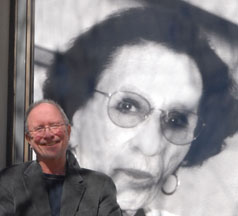
Bill Ayers in front of the Museum's wall mural
Last June, on the day of the family funeral for Maxine we attended an informal student gathering and memorial here at TC, and heard a kaleidoscope of heart-felt remembrances. A theme circled in and out of the conversation as person after person expressed a common feeling: Maxine was one of my best friends. It was unrehearsed and genuine, spontaneous and intimate, and it’s a feeling echoing around the room today: Maxine and I were definitely best friends. Hundreds, perhaps thousands of us share that bond, and there’s one more message here, a lesson in the enormous power—can I say a kind of secular sacredness—to be found in being fully present, entirely at hand with another human being. That was another gift.
Maxine Greene—Presente! |
|
|
| |
|
|
|
|
|
|
|
|
| |
|
For Maxine – I can hear her say
by Michelle Fine
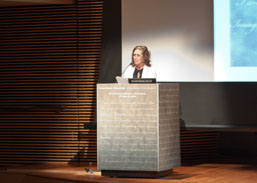
Photo credit: Heather Van Uxem Lewis; Teachers College, Columbia University
“I am a believer in the unanswerable questions; the really hard ones.” (Maxine Greene)
In the Fall after the harrowing Summer of 2014, Maxine’s words haunt as we drown in unanswerable questions.
We sit in puddles of cumulative tears dropped after witnessing videos of police murdering Eric Garner and Michael Browne;
babies, children, mothers and fathers standing at the US – Mexico border asking for sanctuary;
Russia invading Ukraine and Ebola invading African countries starved of infrastructure,
as 2000 Gazans and 71 Israelis were killed in a devastating assault followed by the now predictable occupation of more land by Israel.
This was the summer we learned about ISIS and beheadings, when unknown numbers of drones are dropping bombs in Pakistan, Iraq and elsewhere.
Not even Robin Williams could make us smile.
This is a time when thinking persons experience a crisis of confidence in hope; a desire to flee; a profound destabilization of our sense of ourselves, our country, what it means to be human(e). In the deepest bowels of my soul, in my belly, I miss and need Maxine, so much.
I want to offer some moments of when Maxine shed light for me, with me, on me, beside me… an academic mother, lover, mentor, a woman who spun images, who spoke out loud what I feared to say, who created spaces where I could nestle with my darkest dis-ease/anxiety/shame. Even toward the end, more fragile and more daring, she offered light as she sipped cranberry juice through a straw, with oxygen tubes floating into nostrils, exhaling wisdom, humor, and the intimate desire to know. So we chatted about war, the imagination for evil, about Obama, public education, gossip about colleagues and then her newest discovery, Dancing with the Stars – “Have you ever seen it?” She was cared for impeccably by Alta and Anna even as so many who adored her would arrive like refugees from cold, dark institutions, sneaking up the elevator to apartment 3C – because the neighbors banned her salons – and then being captivated by a living room of light and windows and welcome, that is, by Maxine. “Thank you for coming” with a chuckle, she would announce as I entered, leaving me unsure if I was being invited in or invited to leave. Her ambivalence danced with desire to be with, be known, be loved, have red lips, be sure and be uncertain.
There was the moment, mid-1990s, when we were teaching at Bedford Hills Women’s Prison. Maria Torre and I invited Maxine to come teach a class. She agreed and schlepped north up the Saw Mill, through the existential quicksand of prison scanning, metal detectors, barbed wire, heavy noise of metal slamming doors, cold stares, lives held in abeyance, children without mommas, surrounded by eyes of want, betrayal, desire, regret and appetite. She entered cautiously, in black, a room of smart, hungry, courageous complex women in green, and began to speak of Tillie Olson’s I stand here ironing; to speak of the loss of Linda her daughter, anxious of course about the too easy slippage between losing a child to cancer and losing a child to incarceration. And the women loved her. They understood her. They so appreciated her integrity, sadness, her humanity. They loved her low voice, her relentless willingness to ask impossible questions, her red lips, dark hair, very white skin, and her ability to travel from art to literature and from familiar to esoteric references and still remain grounded, huddled in a blanket of affect, in the room. Within the cold plastered walls, Maxine was our intellectual and emotional Sherpa who accompanied and protected us as we traveled together through deep, collective circuits of loss and regret as if that were simply human.
And when Maxine wasn’t a light in dark times she was a noise in quiet times. Have you ever sat next to Maxine in a space where quiet was the obvious, only choice and whispering the preferred mode of communication? She and I were in Gloria Steinhem’s living room, maybe a decade ago; a stunning space of women in rapture with politics, ideas, Gloria’s apartment and of course Gloria. We sat in a huge circle with Gloria as the center. Maxine and I shared a mini-sofa at the Southeast corner of the circle, her cane on the floor, pocketbook stuffed between our thighs. Gloria was speaking when Maxine leaned over to me: “Do you remember she slept with Henry Kissinger?” Her query was louder than expected – I knew and she didn’t. Actually almost everyone knew but Maxine.
Bad enough.
But she continued,
“I never did that.”
And continued,
“Did you?”
I hurriedly gathered our bags, her cane, mobilized the strength to get us both upright, giggling with shame, pride and embarrassment – rushing to find a cab.
|
|
|
|
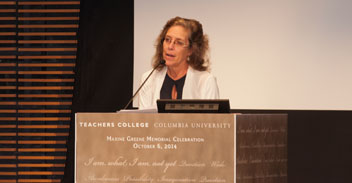
Photo credit: Heather Van Uxem Lewis; Teachers College, Columbia University
And then, most recently, there was the hospital, where she was clearly in pain and discomfort but remained a strong and caring light for all who visited and attended to her. She never complained and only begged Anna for ice chips. “I am scared, don’t let me die.” “I can’t breathe, I may throw up.” “I see you both and I am calm.” “This is my son and his wife, we had a beautiful wedding.” Even as she entered a morphine-induced stupor, she would offer a slightly hallucinatory lecture on Dewey, Sartre or Merleau Ponty, Guernica, a piece of music or a performance at Lincoln Center.
“I do remember your mother, Michelle. She was strong, she spoke her views.”
“What was the occasion when you were wearing a white suit, and how are your boys?”
At one point she turned to me, “We should go to Ohio” to be with Janet Miller who was speaking at Patti Lather’s retirement. “We should be there. I am famous, but so are you.” Trouble was…. We (or at least I ) weren’t invited; she was on intravenous drugs, Tim was talking to doctors about hospice and yet, “I want to do something meaningful.”
“You have and you will again,” Carole and I spoke like sisters in synchrony.
“Well, I hope so.”
Carole and Maxine then discussed the next edition of Dialectic of Freedom that they would begin as soon as Maxine left Lenox Hill Hospital.
With ironic, delicious, well-deserved confidence, from her hospital bed and in that white and blue spectacled hospital garb, she knew she was smart and bold. Never once did she ask the question that haunted her for at least the 40 years I knew her: “Was I OK?” asked after every public lecture.
As Connie, her daughter in law and I, filled the room, and probably the hallways with song – preferably show tunes that Connie knew and I could fake – Maxine would muster strength and her remarkable memory to complete the chorus. One morning, from her exhausted body, under a crumple of sheets re-ordered with love and dedication by Anna, with thirsty lips, parched throat, oxygen, glasses and eyes of fear, she boomed out, “SOLIDARITY FOREVER!” and asked us if it were may 1, assuring us that “The union makes us strong!”
And she was so right, about all the unions she joined, created and nurtured.
A stunning feature of a light in dark times is the last chapter, the refraction of the light offered for almost a century. At the end, so many showed up to be her light, to sit in her shadow, to swallow her last words so they might live inside us. Tim, Connie, Anna, Carol, Janet, Jean, Susan and so many others, gathered to be with her. Maxine was surrounded by loving arms, sweet desires and all of us yearning for one more day, one more hallucinatory lecture with a smile of recognition, “it’s so nice of you to come” dismissing and appreciating us. “I love you darling.”
Maxine knew indeed, that we were not finished yet. In her last moments she asked for Linda.
Maxine, in the shadow of your passing, we are onto the really hard questions. Problems are wicked. We need you more than ever, even as we dance on your sweet shoulders. Sleep well my friend; your words keep us awake as we build fragile shelters of not-so-solidarities to prepare for the winter.
Indeed, like Maxine, we are all not finished yet.
I will miss her enormously. But I think she would tell us, “Don’t mourn, host a salon. Or a movement, or watch the incredible grace of a tree, poem, a child, a classroom that hums with questions. Put on lipstick. Make time for friends. Grow a sauna of teachers and learners. Be a light in dark times.”
Goodbye sweet Maxine, until we meet again. |
|
|
|
|
|
|
|
|
|
|
|
|
|
|
|
